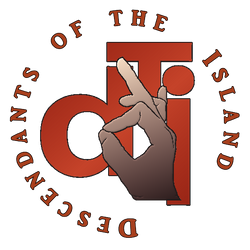About DTI

Descendants of The Island is inspired by the descendants of enslaved people brought through the ports of Charleston, SC. While many slaves were sent to different parts of America, many were kept in Charleston, where they worked to build the city—often without credit for their contributions, whether tangible or intangible, such as labor or inventions.
James Island, SC, located near Folly Beach (also known as "The End of the Earth"), is about 5 minutes from the beach and mere seconds away from the island's main high school. This area, often referred to as "Down the Island" (DTI), was originally established on Cross Cut, another section of James Island.
James Island High School divides two communities on the island: one of the wealthiest and one of the poorest. The Lawton Bluff and Dill Bluff plantations housed slaves, whose living quarters were separated from those of their owners by a street. Slaves were not allowed to cross this street, though eventually, some were able to buy property on the "white" side.
In time, the island's black and white communities integrated at James Island High, when the original James Island High (for black students) merged with Fort Johnson High (for white students). This integration brought the stark economic differences between the two groups to the forefront. Yet, what united them were shared experiences—servitude, a love of school and sports, a deep appreciation for organic seafood, vegetation, and the ocean. Many of the wealthier families' children were raised or cared for by black domestic servants, which often led to relationships and connections between the two groups.
For many black families, including mine, affording the same clothing as the wealthy was out of reach. They often wore self-made clothes or hand-me-downs from other black families.
Meet Our Founder:
My grandmother, Lilla Lawton-Rivers, had a unique way of providing clothing for her family—she would shop at yard sales, purchasing items that were no longer wanted by white families. Some of the brands she bought for her grandkids included Izod (now Lacoste) and Agnore purses for the women. My grandmother always believed that if we didn’t look inferior, we wouldn’t feel inferior. She emphasized the importance of keeping ourselves and our homes clean, saying, “Manners will take you further than money ever will,” and “Do more right than wrong.”
I truly believe the kids in our neighborhood thought we were rich—not in money, but in love, because everyone was welcomed regardless of race, gender, or sexual preference. My grandmother even sold frozen Kool-Aid cups, known as “Chilly Bears,” and allowed kids to run tabs. Our refrigerator was always stocked with Chilly Bears and it was like seeing a rainbow every day.
I remember being teased by black children at school for being a book worm, but embraced by white children because of the clothes I wore, thanks to my grandmother’s values. While my peers in the neighborhood could only dream of the opportunities just across the school campus, my grandmother’s philosophy opened doors for me. As we grew up, more people on the island adopted her mindset. Barriers between black and white communities broke down, and relationships between the two groups flourished. My neighborhood became a place of fashion, self-love, and community.
To this day, the people on the island live together in harmony, understanding both what separates them and what brings them together. Many people refer to it as an “Island Thing,” and I agree. No matter where I’ve traveled, I’ve always felt a sense of peace when surrounded by island people. Their dress code, their swag—everything about them is different. No matter how far inland they migrate, the sea always brings them back.
That’s why I created this clothing line. I wanted to design pieces that remind me that being an islander is a state of mind—a mindset that connects like-spirited people. The logo on our tags was intentionally created to reflect the hand that produced this brand. No Googling necessary—it’s a symbol of pride.
Descendants of The Island was established in 2004 by an islander for islanders. My name is Barron Rivers, and I pray that my clothing brings you feelings of hope, pride, joy, freedom, and love of community—just as my grandmother instilled in me. My vision is for those who wear this brand to feel empowered every day, knowing where they came from and believing that the world is their oyster. No goal or dream is too big.
I want our clothing to serve as armor—shielding you from judgment based on race, because the brand speaks for itself. It’s a symbol that says, “What’s understood doesn’t need to be explained.” It’s an icebreaker for uncomfortable conversations and a sign of mutual recognition among people who are different, but united in spirit.

- Barron Rivers
